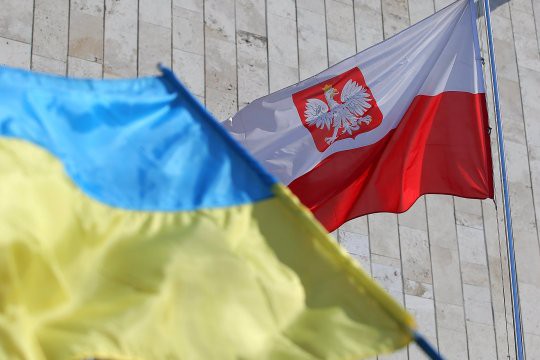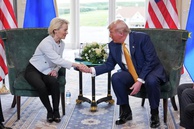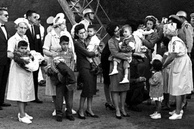Poland is unhappy with Kyiv gravitating towards Berlin, away from Warsaw. This is what Polish strategists warned about back at the dawn of the 20th century, but Poland’s current authorities just wouldn’t listen.
Jozef Pilsudski's political opponent, Roman Dmowski, wrote during the 1930s that in Austrian Galicia the Ukrainian project was initially a purely political one conceived as a means of weakening the Poles. (1)
At the same time, at the start of the 20th century, the Ukrainian project was essentially becoming anti-Russian, since Russia’s access to the ore and coal riches of Donbass turned it into an economic rival of Berlin, strengthening Russia’s hand on the Black Sea with a negative impact on Germany’s cooperation with Turkey.
“All these dangers and problems were eliminated by the bold plan for creating an independent great Ukraine,” Dmowski wrote. “Taking into account the cultural and national weakness of the Ukrainian element, its heterogeneity, the presence on the Black Sea coast of other ethnic groups that have nothing in common with Ukraine, the presence in the region of the Jewish population and German colonists (in the Kherson region and Crimea), one could be sure that the new state would be under powerful German influence... Independent Ukraine was conceived as an economic and political branch of Germany..." (2)
During the past century, the Germans needed not just an independent Ukraine, but the largest possible independent Ukraine, stretching all the way to Donbass, Kherson and Crimea. From a geopolitical standpoint, little has changed ever since, with the German government, led by pro-American Chancellor Olaf Scholz, still advocating for these territories to become part of Ukraine, and, judging by what Dmowski wrote, we know why.
Warsaw has always sought to “privatize” the Ukrainian project in order to make it less anti-Polish and more anti-Russian. However, Poland’s ruling Law and Justice party’s stake on Germanophobic sentiment in a bid to rev up the electorate in the walkup to parliamentary elections has led to a cool in Polish-German relations.
At the same time, Polish experts admit Kyiv’s apparent desire to get closer to Berlin. (3) First, Germany carries more weight in the EU and NATO than Poland, which is an important factor for the Zelensky regime. Secondly, the Bundeswehr's weapons are better than what the Polish Army can offer. Zelensky is actively campaigning and hopes to receive modern German missiles and other weapons. Thirdly, Ukrainian nationalism in its classical form makes territorial claims to Poland (Ukrainian nationalists view Poland’s 18 border regions as ethnic Ukrainian lands). Fourthly, focusing on Germany is simply more profitable, because the Polish economy pales in comparison with the German economic might.
If Warsaw had been quick to realize the risk of such a development, it might be safe to assume that it would not have donated so much money to help Kyiv. The problem is, however, that the Polish elites are absolutely not sovereign in their actions. They are dependent on the United States and forced to act in the best interest of the Washington-Berlin geopolitical axis.
The sheer fact of the emergence of such an axis is beneficial to Kyiv. Previously, the Germans sought to make Europe less Anglo-Saxon, but now the Germans and the Anglo-Saxons are in the same geopolitical boat. Right now, there are no signs of any split between Washington and Berlin on key foreign policy issues. They both support the neo-Nazi regime in Kyiv, which gives the latter a reason to hope it is here to stay, blissfully unaware of the illusory nature of such hopes due to other objective reasons, which we will not be discussing here.
Amid the heat of their latest disagreements and disputes, the Poles are urging Ukraine to compare the size of the military assistance it has received from Warsaw and Berlin, and make a choice in favor of the former. Indeed, Warsaw donated to Kyiv almost 2 percent of its GDP, a hefty 29.2 percent of its tanks, 28.7 percent of howitzers and 19.3 percent of armored fighting vehicles. (4) Berlin's contribution in percentage terms is more modest, but Kyiv still sees it more profitable to cozy up to Berlin.
The reason for this turn was the change in the balance of power in Europe. Until a certain point in time, NATO Europe was conditionally divided into two camps. One comprised Germany and France, who chart the EU’s international policy, while the other included Eastern European countries, which, acting in the best interest of the of the United States, prevented the Franco-German duumvirate from calling all the shots on the continent. The United States acted as an umpire in disputes between Eastern and Western Europe with Poland being the most vocal Eastern European debater.
Now the situation is different. France is independently active on NATO’s eastern flank, cooperating ever closely with Romania, Ukraine, and Armenia. At the same time, Germany and the United States have come closer together, as if leaving Paris on the sidelines.
Poland, which used to draw political inspiration from scandals it was provoking with Berlin (to Washington’s benefit?), has found itself somewhat redundant now that the Americans no longer need such scandals. This means that Poland is not needed as their initiator. Realizing this, Kyiv did the math and decided that it would gain more by sticking with Washington and Berlin.
This wreaks havoc on Poland’s domestic politics where the opposition Civic Platform party is traditionally pro-German, while the Law and Justice party (PiS) is pro-American. However, in the context of the current foreign policy alliance between the United States and Germany, this division has lost its former meaning for them.
PiS, by inertia, accuses Germany of meddling in the country’s electoral process and says it is inadmissible for some countries to matter more than others within the EU. The deputy head of the Poland-Germany group in the Bundestag, Alexander Müller, dismissed it as just “theatrics” and suggested that this would not last long. (5)
In the new conditions, it seems that at the end of the day Warsaw will have to come to terms with the current situation and build relations with its European partners bearing in mind the changed realities.
The views of the author are his own and may differ from the position of the Editorial Board.
---------------------------------------------------------------------------
- Dmowski, R. Niemcy, Rosja i kwestia Polska, 1930
- Dmowski R. Swiat powojenny i Polska. Wydanie drugie. S. 241.
- https://www.money.pl/gospodarka/to-moze-byc-kolejny-cios-dla-polski-kijow-spoglada-w-kierunku-niemiec-6943618966096608a.html
- https://myslpolska.info/2023/10/08/z-reka-w-nocniku/
- https://www.euractiv.com/section/politics/news/pis-anti-german-rhetoric-in-polish-election-bothers-berlin/
read more in our Telegram-channel https://t.me/The_International_Affairs

 11:07 13.10.2023 •
11:07 13.10.2023 •



























